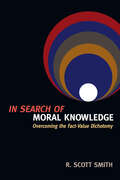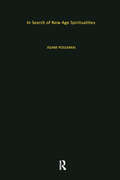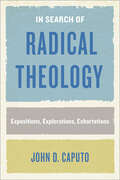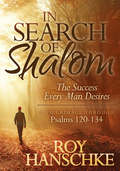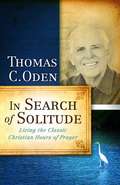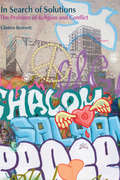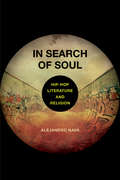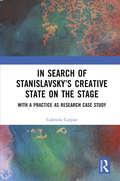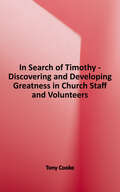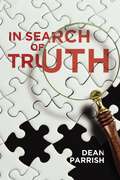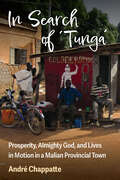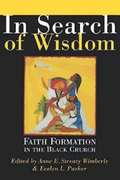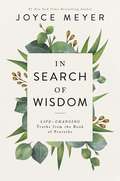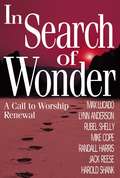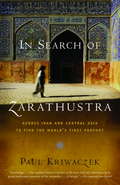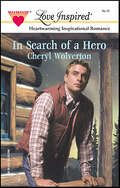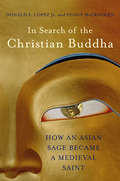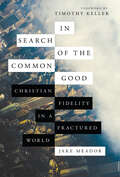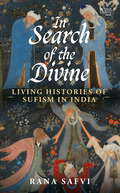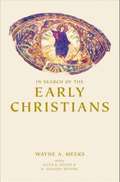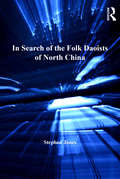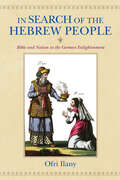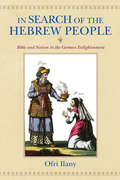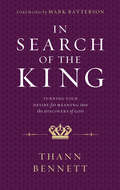- Table View
- List View
In Search of Moral Knowledge: Overcoming the Fact-Value Dichotomy
by R. Scott SmithFor most of the church's history, people have seen Christian ethics as normative and universally applicable. Recently, however, this view has been lost, thanks to naturalism and relativism. R. Scott Smith argues that Christians need to overcome Kant's fact-value dichotomy and recover the possibility of genuine moral and theological knowledge.
In Search of New Age Spiritualities (Routledge New Critical Thinking in Religion, Theology and Biblical Studies)
by Adam PossamaiThe search for an adequate understanding of the New Age phenomenon is fraught with difficulties when examined within the perspectives of sociology of religion which have shed light on religion in modernity. New Agers cannot be located easily in the secularisation narrative; they move through fluid networks rather than settled collectivities; they assemble personal syncretisms of belief, myth and practice rather than subscribe to codified doctrines and prescribed rituals. New Age is quickly found to be a label that is unacceptable to many of those designated as New Agers. This book advances our understanding of the so-called New Age phenomenon by analysing accounts of insiders' religious experience and orientations. This approach is brought to bear not only on the study of written documents relating to New Age and its putative antecedents, but on the analysis of in-depth interviews with thirty-five spiritual actors.
In Search of Radical Theology: Expositions, Explorations, Exhortations (Perspectives In Continental Philosophy Ser.)
by John D. CaputoThese sparkling essays from a seasoned scholar are &“a great breath of fresh air in our claustrophobic and catastrophic time&” (Cornel West). Capturing a career&’s worth of thought and erudition, this rich volume treats readers to creative thought, careful argumentation, and sophisticated analysis transmitted through the lucid, accessible prose that has earned the author a wide readership of academics and non-academics alike. In tackling &“radical theology,&” John D. Caputo has in mind the deeper stream that courses its way through various historical and confessional theologies, upon which these theologies draw even while it disturbs them from within. They are well served by this disturbance because it keeps them on their toes. When we read about professional theologians&’ losing their jobs in confessional institutions, the chances are that, by earnestly digging into what is going on in their tradition, they have hit upon radical theological rock. Unlike modernist dismissals of religion, radical theology does not debunk but re-invents the theological tradition. Radical theology, Caputo says, is a double deconstruction—of supernatural theology on the one hand and of transcendental reason on the other, and therefore of the settled distinctions between the religious and the secular. Caputo also addresses the challenge for radical theology to earn a spot in the curriculum, given that the &“radical&” makes it suspect among the confessional seminaries while the &“theology&” renders it suspect among university seminars. Journeying from the academy to contemporary American culture, In Search of Radical Theology includes a captivating presentation of radical political theology for the time of Trump. This utterly unique volume not only brings readers on an enlightening tour of Caputo&’s thought but also invites us to accompany the author as he travels into intriguing new territories.
In Search of Shalom: The Success Every Man Desires
by Roy HanschkeIn an increasingly confusing and crass culture, how can modern males re-discover what makes them matter? With a new view of their own spirituality . . . Everywhere you look, the role of men in society is being attacked, belittled and dismissed as old-fashioned, unnecessary, and most disturbing of all, toxic. With this constant onslaught of negativity, many men are looking at their commonplace lives wondering &“is this is all there is?&” They dream of making a significant spiritual impact on their families, their neighborhoods, places of business and churches. And it doesn&’t have to be just a dream. With In Search of Shalom, that dream can be reality. For Shalom is so much more than what many may think of as &“peace&”. It stands for the fullness of life that God planned for every person. The man who finds shalom not only experiences it for himself, but also brings it to his world. Using the Pilgrim Psalms as a guide, Christian radio personality Roy Hanschke skillfully uncovers the instructions that can leads a man on a journey of change for himself and his world. Come join the men who are finding their joy in life the way God planned it—men in search of shalom.
In Search of Solitude
by Thomas C. OdenIn Search of Solitude is a collection of meditations that record moments of a spiritual pilgrimage. The purpose of these meditations is to put the soul in touch with the eternal in an ordinary time frame. Tom Oden relies on the ancient classic pattern of daily meditative 'hours' to order the life of prayer. An 'hour' here refers not to sixty minutes but to the phases of the daily cycle, related to darkness and light. Spending even a minute in prayer and meditation, seven times a day, sanctifies the entire daily cycle. In Search of Solitude presents selections from Tom Oden's lifetime of personal meditations, arranged according to the daily 'hours' for seven weeks. A series of prose interludes explain the understanding of the flow of time in which the acts of praise occur. Organized during the ten years following his wife's death, the meditations point to particular events and glimpses of reality. Readers can meditate on them to grasp meaning and applications for their own lives. Those who mourn the lost richness of an ordered prayer life will find In Search of Solitude a contemporary means of re-grounding their spirituality, simply by accessing this celebrated ancient structure, made available in electronic format at their fingertips.
In Search of Solutions: The Problem of Religion and Conflict (Religion and Violence)
by Clinton BennettReligion has played a role in conflict throughout history, with religious scriptures often being used to justify violence. In Search of Solutions evaluates the role of religion in Northern Ireland, Bosnia and Israel-Palestine. The book argues that religion has a tendency towards conflict and that peace is best guaranteed when human individuals commune directly with the divine without the mediation of organized religions. Different approaches to the reading of scriptures are introduced, drawing on post-modern theory. In Search of Solutions will be invaluable for the student seeking a clear overview of both the theory and the practice of religion in conflict resolution.
In Search of Soul: Hip-Hop, Literature, and Religion
by Alejandro NavaIn Search of Soul explores the meaning of “soul” in sacred and profane incarnations, from its biblical origins to its central place in the rich traditions of black and Latin history. Surveying the work of writers, artists, poets, musicians, philosophers and theologians, Alejandro Nava shows how their understandings of the “soul” revolve around narratives of justice, liberation, and spiritual redemption. He contends that biblical traditions and hip-hop emerged out of experiences of dispossession and oppression. Whether born in the ghettos of America or of the Roman Empire, hip-hop and Christianity have endured by giving voice to the persecuted. This book offers a view of soul in living color, as a breathing, suffering, dreaming thing.
In Search of Stanislavsky’s Creative State on the Stage: With a Practice as Research Case Study
by Gabriela CurpanThis book rediscovers a spiritual way of preparing the actor towards experiencing that ineffable artistic creativity defined by Konstantin Stanislavski as the creative state. Filtered through the lens of his unaddressed Christian Orthodox background, as well as his yogic or Hindu interest, the practical work followed the odyssey of the artist, from being oneself towards becoming the character, being structured in three major horizontal stages and developed on another three vertical, interconnected levels. Throughout the book, Gabriela Curpan aims to question both the cartesian approach to acting and the realist-psychological line, generally viewed as the only features of Stanislavski’s work. This book will be of great interest to theatre and performance academics as well as practitioners in the fields of acting and directing.
In Search of Timothy: Discovering and Developing Greatness in Church Staff and Volunteers
by Tony CookeYou were created by God to make a significant impact in your local church. Pastors all over the world are looking for staff and volunteers who are willing to assist in the growth and advancement of the Kingdom of God. If you have a desire to be used by God and be highly profitable to your pastor, In Search of Timothy is the book for you! Today’s pastor recognizes the great need for modern-day Timothys―men and women who have a heart for God, a passion for people, and a desire for excellence! When you volunteer to serve in your church or join a church staff, you have embraced an essential heavenly assignment. This book is a must if you desire to maximize your personal performance and increase your effectiveness as a team player in your local church. In Search of Timothy will get you fired up, geared up, tuned up, and ready to make a meaningful contribution to the Kingdom of God!
In Search of Truth
by Dean ParrishEveryone&’s truth is in their own perspective and choosing. What you choose to believe becomes your accepted truth. However, just because you accept something as truth, does not mean it is real. Some truths can be subjective, but real or absolute truth remains constant and unchanging and will ultimately be revealed whether you believe it or not.This easy-to-read book uses humor, life experiences and stories to give valuable insights on truth and perspective. You will be both entertained and challenged as you learn that finding real truth often requires you to dig deeper. What you discover about the word truth, may surprise you.
In Search of Tunga: Prosperity, Almighty God, and Lives in Motion in a Malian Provincial Town (African Perspectives)
by André ChappatteThis volume on Muslim life focuses on young male migrants of rural origin who move to build better lives in Bougouni, a provincial town in southwest Mali. Describing themselves as “simply Muslims” and “adventurers,” these migrants aim to be both prosperous and good Muslims. Drawing upon seventeen months of fieldwork, author André Chappatte explores their sense of prosperity and piety as they embark on tunga (adventure), a customary search for money and more in a tradition that dates back to the colonial period. In the context of the current global war on terrorism, most studies of Muslim life have focused on the politics of piety of reformist movements, their leaders, and members. By contrast, In Search of “Tunga” takes a perspective from below. It opens piety up to “simply Muslims,” although the religious elites have always claimed authority and legitimacy over piety. Is piety an exclusive field of experiences for those who claim to strive for it? What does piety involve for the majority of Muslims, the non-elite and unaffiliated Muslims? This volume “democratizes” piety by documenting its practice as going beyond sharply defined religious affiliations and Islamic scholarship, and by showing it is both alive and normative, existential and prescriptive. As opposed to studies that build on the classic historical connections between the Maghreb and the Sahel, the southbound migration from the Sahel documented in this book stresses the overlooked historical connections between the southern shores of the Sahara and the lands south of those shores. It demonstrates how the Malian savanna, this former buffer-zone between ancient Mande kingdoms and thereafter remote areas of French Sudan, is increasingly becoming central in today’s Sahel contexts of desiccation and insecurity.
In Search of Unity: An Appeal to Fundamentalists and Evangelicals
by Edward DobsonBack Cover: "An Undercurrent of Dissent Divides Many Evangelicals and Fundamentalists. WHAT CAN BE DONE To SOLVE THIS PROBLEM? To most persons 'out there,' evangelicals and fundamentalists are one and the same. Not so. There are differences between the two ideologies--differences that have often stymied cooperation among Christian conservatives. Desiring to halt this historical problem, Edward Dobson presents a much-needed call for unity that will help bring persons from both persuasions to a common ground of Christian love. Dobson writes from the heart of the fundamentalist movement and examines many of the crucial issues dividing evangelicals and fundamentalists--the extremism of various partisans on both sides, the problem of egocentric human leaders, and a subtle drifting away from scripture on the part of some. Further, questions concerning lifestyle, responses to social issues, and correct doctrine are put in their historical context. Throughout, Dobson stresses the need for unity. 'The mandate of Scripture is to practice truth in love,' he says. According to him, unity can allow for diversity if it is based on the fundamentals of Christianity: 'We need to place all of our ideas in subjection to Christ. Only with Him in the center can a true balance occur.' And In Search of Unity is a major step in the direction of balance."
In Search of Wisdom: Faith Formation in the Black Church
by Evelyn L. Parker Anne E. Wimberlyedited by Anne E. Streaty WimberlyA guide for pastors, church leaders, and all who help African Americans in their search for a meaningful Christian lifestyle. Forming Christians--leading fallen and flawed human beings into the path of discipleship to a crucified and risen Lord--is one of the central, if not the central, tasks of all Christian churches. It is a difficult enough task anywhere, but for African Americans, beset by racial conflict, personal crises, generational separation, and other concerns, it is especially so. African American churches must work particularly hard to counter the messages their members receive from the dominant and often unfriendly culture. This book employs the biblical text and African tradition to draw on the idea of the search for wisdom as a potent way to help African Americans in their pursuit of genuine Christian discipleship. Wisdom in African American tradition is not simply knowledge; rather, it is those insights, attitudes, beliefs, behaviors,and practices that create and sustain a life of hope and that produce an inherent sense of the worth of one's self. If their members are to engage in the search for wisdom, African American churches must build an intentional ministry of faith formation. Wisdom can be gained, the authors argue, when African Americans listen to the black oral tradition with its proverbial sayings, revered Bible stories, songs, and narratives from the lives of exemplary individuals. The book offers several similar avenues for the search for wisdom, including helpful models of black males mentoring younger black males, as a remedy to the destructive effects that contemporary culture has on this segment of the African American community.
In Search of Wisdom: Life-Changing Truths in the Book of Proverbs
by Joyce Meyer#1 New York Times bestselling author Joyce Meyer takes us on a journey through the wisdom of Proverbs that leaves us transformed and prepared to face daily choices and challenges.The book of Proverbs is a treasure trove of spiritual and practical wisdom that equips us to live our best lives. Knowledge is important, but if it isn't converted into action, it fails to create transformational change in our lives. It is important to gain a thoughtful and practical understanding of the seven foundational principles in the book of Proverbs:Wisdom, Understanding, Prudence, Knowledge, Discretion, Discernment, andFear of the Lord.If we desire to possess these qualities, we must make a commitment to a deeper understanding and implementation of these values in our daily lives.Featuring inspiring questions to promote thoughtful reflection, In Search of Wisdom will enlighten you with God's understanding and teach you the foundational principles and secure God's help in practicing them.
In Search of Wonder
by Lynn AndersonChristians everywhere long to worship our God and Savior Jesus Christ. Uplifted hearts hunger for the Father's presence. Worship satisfies that longing and hunger. But congregational worship too often leaves worshipers feeling empty; the wonder and awe having been quenched by stale and predictable worship services. "In Search of Wonder" seeks to bring fellow worshipers, like yourself, back to the heart, of biblical, inspirational, and expectant worship. Come join these seven searchers of the Word: leave pointless issues behind, boldly seek God's Word, and find the true nature of genuine worship. The terrain may be unfamiliar and the paths less traveled, but together we will rediscover the wonder, awe, and authenticity of worshipping our mighty God with a renewed heart and purpose.
In Search of Zarathustra: The First Prophet and the Ideas That Changed the World
by Paul KriwaczekThe quest to trace the influence of the greatest and most successful religious teacher of the ancient world.
In Search of a Hero
by Cheryl WolvertonTO ERR IS HUMAN...But attorney Rebekkah Hawkley figured it would take nothing short of divine intervention for Andre Watson to learn forgiveness. The stubborn Texan might have come home to save his father’s law firm from a shadowy threat, but he refused to forget an age-old family feud. If only Rebekkah could convince Andre that his dad needed his love-and that she didn’t....As Andre saw it, unyielding Rebekkah ought to practice what she preached. But her troubled past didn’t concern him nearly as much as her future. He had every intention of showing her that a woman needed more in her life than church and a career. Namely: love, marriage-and him!
In Search of the Christian Buddha: How an Asian Sage Became a Medieval Saint
by Donald S. Lopez Jr. Peggy MccrackenThe fascinating account of how the story of the Buddha was transformed into the legend of a Christian saint. The story of Saint Josaphat, a prince who gave up his wealth and kingdom to follow Jesus, was one of the most popular Christian tales of the Middle Ages, translated into a dozen languages, and cited by Shakespeare in The Merchant of Venice. Yet Josaphat is only remembered today because of the similarities of his life to that of the Buddha. In Search of the Christian Buddha is set against the backdrop of the trade along the Silk Road, the Christian settlement of Palestine, the spread of Islam, and the Crusades. It traces the path of the Buddha's tale from India and shows how it evolved, adopting details from each culture during its sojourn. These early instances of globalization allowed not only goods but also knowledge to flow between different cultures and around much of the world. Eminent scholars Donald S. Lopez Jr. and Peggy McCracken reveal how religions born thousands of miles apart shared ideas throughout the centuries. They uncover surprising convergences and divergences between these faiths on subjects including the meaning of death, the problem of desire, and their view of women. Demonstrating the incredible power of this tale, they ask not how stories circulate among religions but how religions circulate among stories.
In Search of the Common Good: Christian Fidelity in a Fractured World
by Jake MeadorCommon life in our society is in decline. Our communities are disintegrating, as the loss of meaningful work and the breakdown of the family leave us anxious and alone—indeed, half of all Americans report daily feelings of loneliness. Our public discourse is polarized and hateful. Ethnic minorities face systemic injustices and the ever-present fear of violence and deportation. Economic inequalities are widening. In this book, Jake Meador diagnoses our society's decline as the failure of a particular story we've told about ourselves: the story of modern liberalism. He shows us how that story has led to our collective loss of meaning, wonder, and good work, and then recovers each of these by grounding them in a different story—a story rooted in the deep tradition of the Christian faith. Our story doesn't have to end in loneliness and despair. There are reasons for hope—reasons grounded in a different, better story. In Search of the Common Good reclaims a vision of common life for our fractured times: a vision that doesn't depend on the destinies of our economies or our political institutions, but on our citizenship in a heavenly city. Only through that vision—and that citizenship—can we truly work together for the common good.
In Search of the Divine: Living Histories of Sufism in India
by Rana SafviSufism, called the mystical dimension of Islam, is known for its inclusive nature, as well as its ethics of love and compassion, its devotional music, art and architecture. In India's syncretic culture, Sufism developed a distinct character, and harmoniously embraced the Bhakti traditions of North India.Rana Safvi's In Search of the Divine delves into the fascinating roots of Sufism, with its emphasis on ihsan, iman and akhlaq, and the impact it continues to have on people from all communities. Safvi relies not only on textual sources but also on her own visits to dargahs across the country, and the conversations she has with devotees and pirs alike. The book evokes in vivid detail the sacred atmosphere she encounters - the reverent crowds, the strains of qawwali and the fragrance of incense, as well as highlights the undeniable yet often forgotten contributions of women in Sufism. The resulting text is at once modern and a tribute to the rich and textured past.Weaving together fact and popular legend, ancient histories and living tradition, this unique treatise examines core Sufi beliefs and uncovers why they might offer hope for the future.
In Search of the Early Christians: Selected Essays
by Wayne A. Meeks Allen R. Hilton H. Gregory SnyderA central figure in the reconception of early Christian history over the last three decades, Wayne A. Meeks offers here a selection of his most influential writings on the New Testament and early Christianity. His essays illustrate recent changes in our thinking about the early Christian movement and pose provocative questions regarding the history of this period. Meeks explores a fascinating range of topics, from the figure of the androgyne in antiquity to the timeless matter of God's reliability, from Paul's ethical rhetoric to New Testament pictures of Christianity's separation from Jewish communities. Meeks' introduction offers a retrospective on New Testament studies of the past thirty years and explains the intersection of these studies with a variety of exploratory and revisionist movements in the humanities, embracing social theory, history, anthropology, and literature. In an epilogue the author reflects on future directions for New Testament scholarship.
In Search of the Folk Daoists of North China
by Stephen JonesThe living practice of Daoist ritual is still only a small part of Daoist studies. Most of this work focuses on the southeast, with the vast area of north China often assumed to be a tabula rasa for local lay liturgical traditions. This book, based on fieldwork, challenges this assumption. With case studies on parts of Hebei, Shanxi, Shaanxi, and Gansu provinces, Stephen Jones describes ritual sequences within funerals and temple fairs, offering details on occupational hereditary lay Daoists, temple-dwelling priests, and even amateur ritual groups. Stressing performance, Jones observes the changing ritual scene in this poor countryside, both since the 1980s and through all the tribulations of twentieth-century warfare and political campaigns. The whole vocabulary of north Chinese Daoists differs significantly from that of the southeast, which has so far dominated our image. Largely unstudied by scholars of religion, folk Daoist ritual in north China has been a constant theme of music scholars within China. Stephen Jones places lay Daoists within the wider context of folk religious practices - including those of lay Buddhists, sectarians, and spirit mediums. This book opens up a new field for scholars of religion, ritual, music, and modern Chinese society.
In Search of the Hebrew People: Bible and Nation in the German Enlightenment (German Jewish Cultures Ser.)
by Ofri IlanyA book that “could serve as an effective introduction to German history, biblical studies and modern nationalism, among other fields” (German History).As German scholars, poets, and theologians searched for the origins of the ancient Israelites, Ofri Ilany believes, they created a model for nationalism that drew legitimacy from the biblical idea of the Chosen People. In this broad exploration of eighteenth-century Hebraism, Ilany tells the story of the surprising role that this model played in discussions of ethnicity, literature, culture, and nationhood among the German-speaking intellectual elite.He reveals the novel portrait they sketched of ancient Israel and how they tried to imitate the Hebrews while forging their own national consciousness. This sophisticated and lucid argument sheds new light on the myths, concepts, and political tools that formed the basis of modern German culture.
In Search of the Hebrew People: Bible and Nation in the German Enlightenment (German Jewish Cultures)
by Ofri IlanyAs German scholars, poets, and theologians searched for the origins of the ancient Israelites, Ofri Ilany believes they created a model for nationalism that drew legitimacy from the biblical idea of the Chosen People. In this broad exploration of eighteenth-century Hebraism, Ilany tells the story of the surprising role that this model played in discussions of ethnicity, literature, culture, and nationhood among the German-speaking intellectual elite. He reveals the novel portrait they sketched of ancient Israel and how they tried to imitate the Hebrews while forging their own national consciousness. This sophisticated and lucid argument sheds new light on the myths, concepts, and political tools that formed the basis of modern German culture.
In Search of the King: Turning Your Desire for Meaning into the Discovery of God
by Mark Batterson Thann BennettNot since C.S. Lewis has a writer so accurately and empathetically described our human condition—our deep longing for meaning and purpose. Lewis himself called it “the long terrible story of man trying to find something other than God which will make him happy.” With fresh insight and authenticity, Thann Bennett invites you to join him on the journey of discovering the one true King. Thann weaves biblical application with personal illustration in a compelling call to action. Bound to be a timeless classic, you will come away knowing your true purpose—intimacy with and service to the King that will echo beyond your years. “In Search of the King is informative and inspirational. It is a must read.” —Jay Sekulow, Chief Counsel of the American Center for Law and Justice (ACLJ), New York Times best-selling author “Thann Bennett’s book, In Search of the King, provides wise souls with an excellent road map. I highly recommend this book.” —Scott Sauls, Senior Pastor of Christ Presbyterian Church in Nashville, Tennessee, and author of Jesus Outside the Lines and Befriend “Thann Bennett’s very personal and engaging style will captivate your heart and imagination and send you on a relentless journey to learn the character of Jesus, walk in His ways, and join His mission.” —Heather Zempel, Discipleship Pastor at National Community Church, and author of Community Is Messy, and Amazed and Confused
